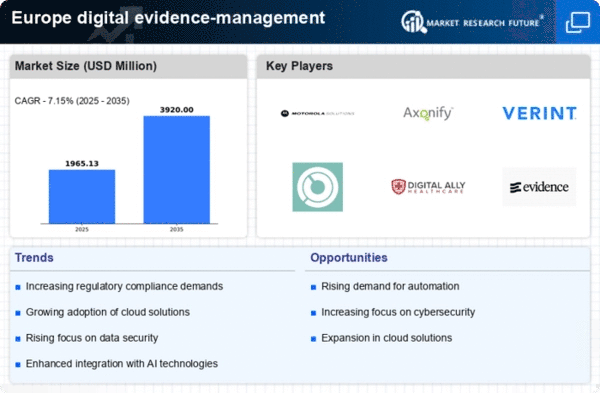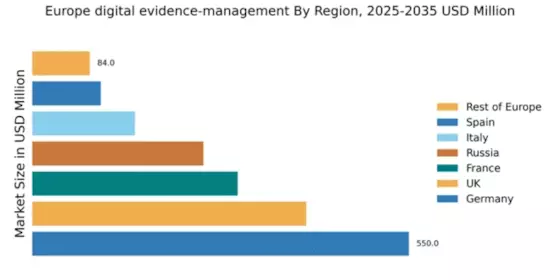Rising Cybersecurity Threats
The increasing prevalence of cyber threats in Europe has heightened the demand for robust digital evidence-management solutions. As organizations face sophisticated attacks, the need for secure storage and management of digital evidence becomes paramount. In 2025, it is estimated that cybercrime could cost European businesses over €200 billion annually. This alarming trend compels law enforcement and private entities to invest in advanced digital evidence-management systems to safeguard sensitive information and ensure the integrity of digital evidence. The digital evidence-management market is thus experiencing a surge in demand as organizations seek to enhance their cybersecurity posture and protect against potential breaches.
Advancements in Forensic Technology
Technological advancements in forensic science are significantly influencing the digital evidence-management market in Europe. Innovations such as enhanced data recovery tools and sophisticated analysis software are enabling law enforcement agencies to manage digital evidence more effectively. In 2025, the market for forensic technology is projected to grow by 15%, reflecting the increasing reliance on digital evidence in criminal investigations. As forensic capabilities evolve, the demand for integrated digital evidence-management solutions that can accommodate these advancements is likely to rise. This trend suggests a dynamic interplay between forensic technology and evidence management, driving market growth.
Emergence of Data Privacy Regulations
The emergence of stringent data privacy regulations in Europe is shaping the digital evidence-management market. With the General Data Protection Regulation (GDPR) and other local laws, organizations must ensure compliance when handling digital evidence. In 2025, it is estimated that non-compliance could result in fines exceeding €4 billion across the region. This regulatory landscape compels organizations to adopt digital evidence-management solutions that prioritize data protection and compliance. As a result, the market is likely to see increased demand for systems that not only manage evidence but also ensure adherence to evolving legal standards, thereby fostering a culture of accountability.
Growing Need for Transparency in Investigations
There is an escalating demand for transparency in investigations across Europe, driven by public scrutiny and the need for accountability. The digital evidence-management market is responding to this need by providing solutions that ensure the traceability and integrity of digital evidence. In 2025, approximately 70% of European citizens express a desire for greater transparency in law enforcement processes. This societal expectation encourages law enforcement agencies to adopt digital evidence-management systems that facilitate clear documentation and reporting of evidence handling. Consequently, the market is likely to expand as agencies prioritize transparency and public trust in their operations.
Increased Investment in Law Enforcement Technology
European governments are increasingly investing in law enforcement technology, which directly impacts the digital evidence-management market. In 2025, it is anticipated that public spending on law enforcement technology will exceed €10 billion, with a significant portion allocated to digital evidence-management systems. This investment is driven by the need to modernize policing practices and improve operational efficiency. As law enforcement agencies seek to enhance their capabilities, the demand for comprehensive digital evidence-management solutions is expected to grow. This trend indicates a robust market environment, fueled by governmental support for technological advancements in policing.

















